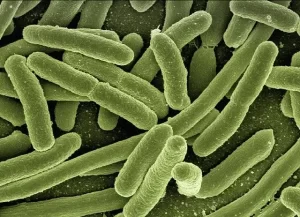China SINOVAC COVID-19 Vaccines: 91.25% effective
- Did Cloud Seeding Unleash a Deluge in Dubai?
- Scientists Identify Gut Bacteria and Metabolites that Lower Diabetes Risk
- OpenAI’s Model Matches Doctors in Assessing Eye Conditions
- UK: A Smoke-Free Generation by Banning Sales to Those Born After 2009
- Deadly Mutation: A New Monkeypox Variant Emerges in the DRC
- EPA Announces First-Ever Regulation for “Forever Chemicals” in Drinking Water
China SINOVAC COVID-19 Vaccines: 91.25% effective
- Red Yeast Rice Scare Grips Japan: Over 114 Hospitalized and 5 Deaths
- Long COVID Brain Fog: Blood-Brain Barrier Damage and Persistent Inflammation
- FDA has mandated a top-level black box warning for all marketed CAR-T therapies
- Can people with high blood pressure eat peanuts?
- What is the difference between dopamine and dobutamine?
- What is the difference between Atorvastatin and Rosuvastatin?
- How long can the patient live after heart stent surgery?
China SINOVAC COVID-19 Vaccines: 91.25% effective.
The Brazilian trial party announced for the third time that it has postponed the release of the protection rate of China SINOVAC( SINOVAC Zhongwei Biotechnology) inactivated COVID-19 vaccine. This postponement has nothing to do with the vaccine efficiency, but to integrate global experimental data.
The Brazilian trial party announced for the third time that it has postponed the release of the protection rate of SINOVAC( SINOVAC Zhongwei Biotechnology Co., Ltd.) inactivated COVID-19 vaccine. This delay has nothing to do with the vaccine efficiency, but to integrate global experimental data. 2.
On December 24, Turkey announced the interim data analysis of the Phase 3 clinical trial of SINOVAC Vaccine in the country, which showed that the protection rate reached 91.25%. 3.
As an “international vaccine” that strictly follows the European and American vaccine testing procedures, SINOVAC Vaccine may not only occupy a large share of developing countries, but may also grab certain orders in developed countries and regions.
At present, SINOVAC has received orders for nearly 300 million doses. 4. The experimental data of rhesus monkeys conducted by SINOVACVaccine showed that there was no “antibody enhancement effect” due to the high homology between the new coronavirus and SARS virus.
 China SINOVAC COVID-19 Vaccines: 91.25% effective
China SINOVAC COVID-19 Vaccines: 91.25% effective
Why are the key data of phase 3 clinical trials postponed three times in a row?
The key data of SINOVAC Vaccine Brazil’s clinical trial has always felt “only the sound of stairs, no people coming down”!
On December 21, according to the “Wall Street Journal”, the inactivated COVID-19 vaccine of SINOVAC (SINOVAC Zhongwei Biotechnology Co., Ltd. hereinafter referred to as SINOVAC) in Brazil reached the threshold of effectiveness in its phase III clinical trial. The drug regulatory authorities of the United States, Brazil and other countries believe that the COVID-19 vaccine can be approved as long as the protection rate reaches 50%. Therefore, the protection rate of SINOVAC vaccine should exceed 50%, but by how much?
The Brazilian test party said it would take December 23 to make the announcement. However, on December 23, the Wall Street Journal once again reported that the release of the relevant data would be delayed by 2 weeks, because SINOVAC needed time to review the Phase 3 clinical data in all countries. analysis. Western media immediately focused their reports on “China’s data is not transparent,” and raised doubts. It is reported that SINOVAC Biological Products once again requested an extension of the release of accurate vaccine efficacy data in order for the company to integrate global test data. Dimas Covas, director of the Butantan Institute in charge of clinical research in Brazil, said that the postponement of the release of data has nothing to do with the effectiveness of the SINOVAC vaccine. The SINOVAC vaccine will still be one of the first vaccines approved in Brazil. . The unified protection rate data should be reasonable, because “the same vaccine can never have three different protection rates.”
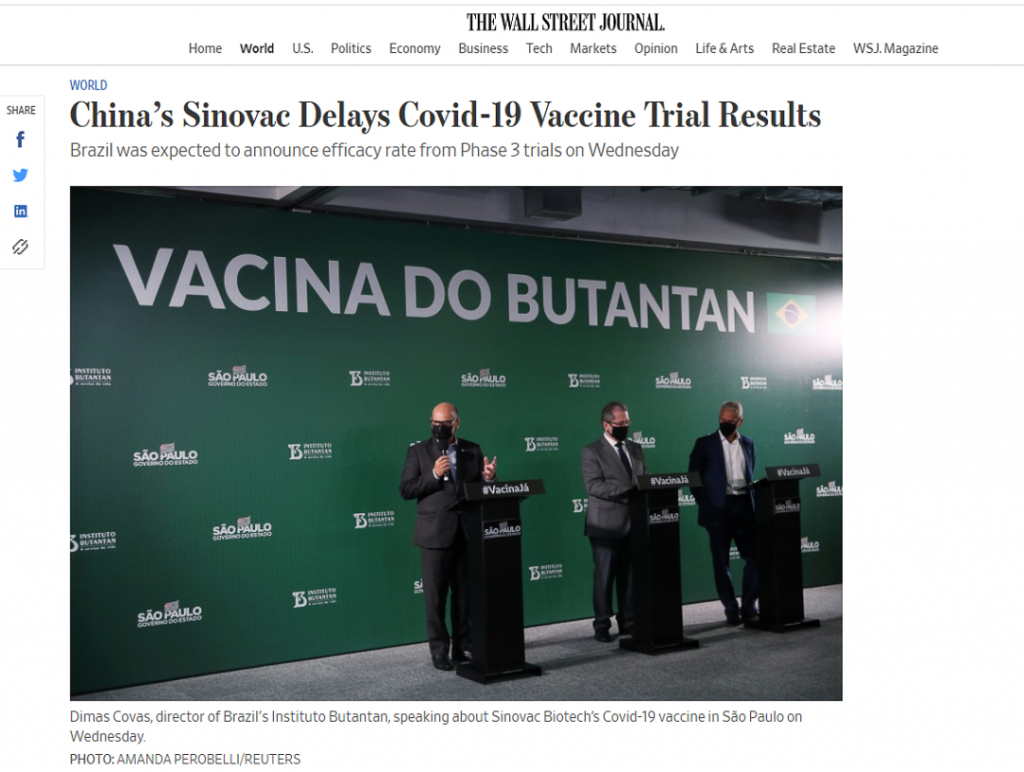
However, this is not the first time that a Brazilian clinical trial has postponed the release of data. Previously, on November 24, there had been news that the study had collected enough infection cases, and the interim analysis results will be announced soon. However, waiting until December 15th, in an interview on the radio, Joao Doria, the governor of Sao Paulo State, Brazil, stated that the release of phase 3 clinical data would be postponed to December 23, because this would allow sufficient The data reaches the final point of clinical research, and the official results are directly announced. According to the trial design, 151 infected persons need to appear in the clinical trial before the final analysis of the research data can be performed.
Foreign media’s questioning ofSINOVAC vaccine cannot change the fact that Brazil is the first country to complete the Phase III clinical trial of SINOVAC vaccine. What is certain is that the vaccine’s effective rate exceeds 50%. The universal standard for vaccine effectiveness is established internationally. The second is that no serious accident occurred during the third phase of the vaccine’s clinical trial. An accident was reported in Brazil, which was later ruled out to be related to the vaccine. Third, SINOVAC delayed the release of data in Brazil, but this has nothing to do with the release of false data.
Brazilian media “UOL” stated that after the release of the data from the third phase of the trial, the Butantan Institute will formally apply to the Brazilian National Health Supervision Agency (Anvisa) for registration of the vaccine on the same day, and the latter will evaluate it. If the rapid approval of Anvisa can be obtained, the Sao Paulo state government of Brazil will start vaccination on January 25 next year as planned.
On December 24, the State Food and Drug Administration announced that it had accepted the SINOPHARM vaccine. In theory, SINOVAC Vaccine will also submit an application for acceptance in the near future.
According to the Duke University Vaccine Order Tracking System, SINOVAC Vaccine has received orders for about 300 million doses in at least nearly 10 countries.
 The Turkish clinical trial broke the interim analysis result, the protection rate of SINOVAC inactivated vaccine reached 91.25%
The Turkish clinical trial broke the interim analysis result, the protection rate of SINOVAC inactivated vaccine reached 91.25%
Although Brazil did not disclose key data, things reversed the next day!
On December 24, local time, news broke from Turkey: The Phase 3 clinical trial of SINOVAC Vaccine conducted in the country, and the results of the interim analysis showed that the protection rate of SINOVAC inactivated vaccine reached 91.25%!
Turkey’s Phase 3 trial started on September 14. Nearly 1,000 volunteers were enrolled first. The current data are from 7371 subjects, a total of 29 people were infected, of which 26 were from the control group and 3 were from the vaccine group. The trial will continue, and the endpoint will be 40 infected persons.
At present, SINOVAC has not given official protection rate data, but if compared with the Turkish test data, although the protection rate is a little lower than that of the mRNA vaccine, there is no significant gap. Moreover, comparing vaccines does not only compare protection rates, but also consider adverse reactions and vaccine availability. Although the detailed clinical data of SINOVAC Vaccine Phase 3 have not yet been released, it is impossible to compare the adverse reaction rate with other vaccines. However, according to the previous phase II data and the Phase 3 data disclosed by the Basilibutan Institute, SINOVAC Vaccine has not been seriously affected. Adverse reactions.
Compared with mRNA vaccines, the storage conditions of inactivated vaccines are a huge advantage.
Pfizer and Moderna’s vaccines need to be stored at minus 70 degrees Celsius and minus 20 degrees Celsius respectively, which is very unfavorable for storage and transportation, greatly affecting the availability of vaccines and increasing the cost of vaccination.
In contrast, the transportation and storage temperature of inactivated vaccines is only 2-8°C, which is very easy to do. Especially for countries and regions with less developed economies, 2-8°C may be the only acceptable temperature.
It is understood that all the quality indicators of SINOVAC inactivated vaccine are still qualified after being placed for more than half a year under conventional storage conditions (2~8℃). In the face of the increasingly serious epidemic, there are more and more mutations.
In fact, it is not the competition between vaccines and vaccines, but the competition between vaccines and viruses. There are more than 5 billion people in the world. The problem is not too many vaccines, but too few vaccines.
Therefore, if SINOVAC inactivated vaccine can finally obtain a protection rate of about 90%, it will also be a very good vaccine. Moreover, this vaccine from China to the world is also a vaccine that has passed the strict verification of phase 3 clinical trials abroad.

The Butantan Institute in Sao Paulo, Brazil played a key role in the Phase III trial with SINOVAC Vaccine.
China, Brazil, Indonesia, and Turkey will approve the market with reference to Brazil’s test data.
SINOVAC Vaccine has won an order for 300 million doses
According to reports, the clinical data of SINOVAC inactivated vaccines in Brazil will be submitted to the drug regulatory agencies in Brazil and China as the basis for applying for marketing approval.
According to the “Straits Times” news, the Indonesian drug regulatory authority has sought data from Brazil for the SINOVAC vaccine through diplomatic channels, hoping to receive the vaccine safety and effectiveness data before December 28, and finally in January next year Start to implement its vaccination plan.
Although China urgently approved the inactivated COVID-19 vaccine of SINOPHARM and SINOVAC in July, it is limited to emergency use by some high-risk groups.
According to news from a press conference held by the Joint Prevention and Control Mechanism of the State Council on December 19, key populations will be vaccinated nationwide.
It is reported that the first batch of COVID-19 vaccines is expected to be vaccinated 50 million times. The first injection will be completed on January 15 and the second injection will be completed on February 15.
In any case, although China does not currently have a serious epidemic, with the sporadic outbreak of the COVID-19 epidemic in the country after the winter, and the approaching of the Spring Festival, the large-scale administration of the COVID-19 vaccine has been put on the agenda.
Before the large-scale launch of inactivated COVID-19 vaccination, China should be able to obtain the support of phase 3 clinical trial data.
Brazil’s standards for approving vaccines and drugs are the same as those in Europe and the United States. Not only does it require data from clinical trials, it also requires verification and certification of production sites. During the period from November 30 to December 11, the Brazilian expert group inspected the SINOVAC vaccine production facility, and the expert team included members of the Brazilian Health Regulatory Agency (Anvisa). On December 22, SINOVAC’s production site was certified by Anvisa.

Previously, on September 30, the government of the State of Sao Paulo in Brazil signed a contract with SINOVAC to purchase 46 million doses of inactivated vaccines.
Brazil will receive 6 million doses of vaccine (including vaccine raw materials that can be subpackaged in Brazil) by the end of December, and the remaining 40 million doses will be received in January next year. It is expected that Brazil will approve the SINOVAC vaccine in January, and then mass vaccination can begin.
Previously, SINOVACrequested Brazil to postpone the release of data, possibly because of the review requirements of a certain country, which required the integration of phase 3 clinical trial data in its own country as the basis for approval for listing.
Of course, this is just a guess, but what is certain is that: After the clinical results in Brazil and Turkey come out, SINOVAC vaccine will obtain important data as an important basis for countries to make marketing approvals.
According to the COVID-19 vaccine pre-orders collected by the Duke University Vaccine Tracking Organization (Launch and Scale Speedometer), SINOVAC has received nearly 300 million doses, including 125 million doses in Indonesia, 60 million doses in Chile, and 50 million doses in Turkey. , 46 million doses in Brazil and 7.5 million doses in Hong Kong.
According to the report released by this research institution, SINOVAC Vaccine, as an “international vaccine” that strictly follows the European and American vaccine test procedures, may not only occupy a large share in developing countries, but also in developed countries and regions. Get a certain order.
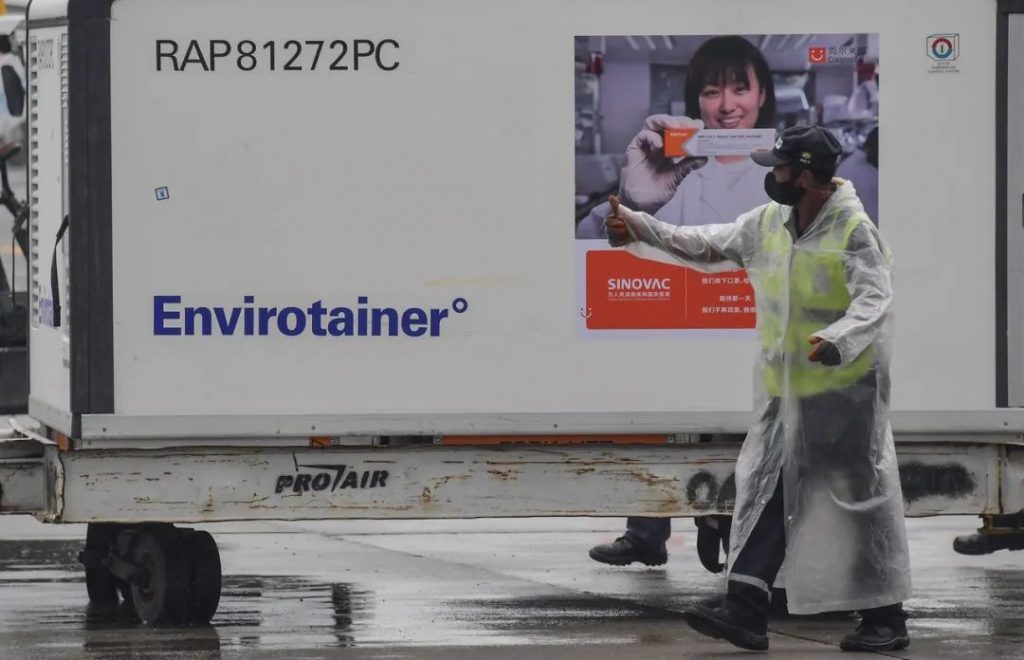
Strictly refer to the “International Vaccines” of the European and American vaccine test procedures: “Science” magazine published the experimental data of SINOVAC vaccine animal experiments without “ADE”
We take this opportunity to review the research process of SINOVACinactivated vaccines.
According to data, the new coronavirus strain used by SINOVAC to manufacture the inactivated vaccine is a strain independently isolated and named “CZ”.
Normal vaccine development requires animal experiments before further clinical trials. Due to the danger of the COVID-19 epidemic, the research of the COVID-19 vaccine cannot be carried out step by step. In order to hurry up, many pre-selected vaccines have not obtained complete animal test results before entering the early clinical trials.
SINOVAC’s phase 1/2 combined clinical trial was approved on April 13, which was one day later than the inactivated vaccine of the China National Biologics Wuhan Institute of Biological Products of SINOPHARM Group, and the clinical trial was launched on April 16.
On May 6, the animal experiment of SINOVACs COVID-19 inactivated vaccine in rhesus monkeys was published in the international blockbuster academic journal “Science”.
The submission time of the research report is April 10. Therefore, for SINOVAC vaccine, animal experiments were not absent. Although the results were not disclosed and published in the first time, the data was obtained before the formal permission for clinical trials was obtained.
Animal experiments have shown that this inactivated vaccine can induce protective antibodies in mice, rats and non-human primates.
These antibodies have shown neutralizing ability against 10 different new coronavirus strains. In the rhesus monkey “challenge” test, the rhesus monkeys were vaccinated with two different doses of vaccines of 3 micrograms or 6 micrograms on the 0th, 7th, and 14th days respectively.
On the 22nd day, the monkeys were artificially infected with the virus through the trachea. Rhesus monkeys in the dose vaccine group obtained complete immune protection. All four rhesus monkeys had no virus detected in throat swabs, anal swabs, or lungs 7 days after exposure to the virus.
Not only that, in the experiment of rhesus monkeys, no so-called “antibody enhancement effect” was found.
What is ADE? The original word is Antibody-dependent enhancement, which can be translated as “antibody-dependent enhancement” in Chinese.
However, ADE is a discovery from dengue fever, which has not yet been confirmed in the COVID-19 pneumonia.
After the “SARS” in 2003, the Institute of Laboratory Animals of the Chinese Academy of Medical Sciences and the Allen Diamond AIDS Research Center worked together to make a SARS vaccine in 2005.
The technical route is to use attenuated poxvirus as a vector to express SARS virus The S protein is used as an antigen to induce antibody production. According to Professor Chen Zhiwei from the University of Hong Kong, after conducting immunoprotective experiments in rhesus monkeys, it was found that the vaccine can indeed induce the production of neutralizing antibodies and can control the virus.
However, if the monkey’s lungs are pathologically examined, it is found that the monkeys have been vaccinated. After being infected with the SARS virus, the pathological damage of the lungs will be more serious, and the ADE phenomenon will appear.
Because the SARS virus and the COVID-19 virus have high homology, the current COVID-19 vaccine also uses the S protein as the immune antigen, so professionals have been worried that the COVID-19 vaccine will also have ADE problems.
If there is this problem, the vaccine will lose the chain, which means that it is difficult to obtain control of the epidemic through the vaccine. However, the SINOVAC vaccine experiment in rhesus monkeys greatly relieved the worry about ADE.
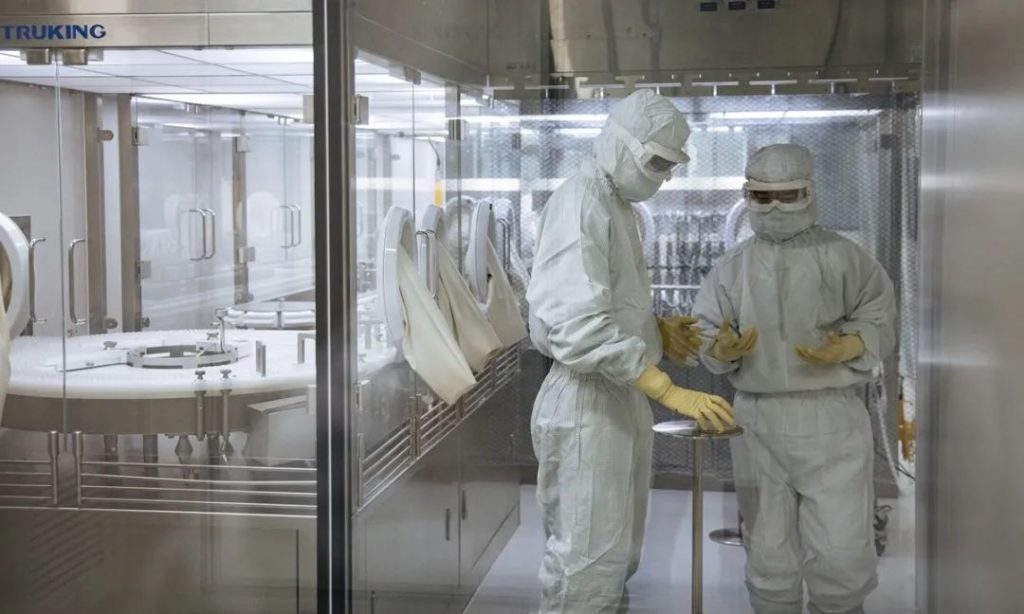 Quality inspector of Beijing Sinovac vaccine production line.
Quality inspector of Beijing Sinovac vaccine production line.
First in “The Lancet/Infectious Diseases”
Release key experimental data of phase 1/2 clinical trials, and the proportion of neutralizing antibodies is 92%
On November 17, the results of the Phase 1/2 clinical trial of SINOVAC Vaccine (NCT04352608) were published in The Lancet/Infectious Diseases.
The test tested two vaccine doses of 3μg and 6μg, as well as two vaccination intervals of 0/14 days and 0/28 days (the interval between the two injections was 14 days and 28 days respectively).
According to the clinical trial results, 3μg vaccination dose (600SU/0.5mL) and 0/14 vaccination interval were selected as the vaccination plan for the subsequent phase 3 clinical trials.
For this vaccination plan, the adverse reaction rate in the vaccine group was 33% in the phase 2 trial and 22% in the control group. There were no serious adverse reactions in the test. All the adverse reactions were relatively mild. The main symptom was pain at the injection site (21% in the vaccine group, 10% in the control group).
At 14 days after the completion of vaccination, 92% of the vaccine group had neutralizing antibodies, and no one in the control group had neutralizing antibodies. However, compared with the 117 recovered patients, the antibody titers produced after vaccination were lower than the neutralizing antibody titers in the recovered patients’ serum.
The phase 2 trial mainly depends on the initial safety and the immunogenicity of the vaccine.
As long as there is no serious adverse reaction, most of the subjects can produce antibodies after vaccination, and even neutralizing antibodies. The phase 2 trial was successful .
From the analysis of the results of the phase 2 trial, the vaccine chose 3μg instead of 6μg in the phase 3 clinical trial, which should be due to productivity reasons and to maximize the protection of more people; and the two-dose vaccine The injection time of 14 days instead of 28 days is chosen to establish immune protection as soon as possible.
This vaccination plan may be a reasonable plan when faced with a serious epidemic, but it may not be the most ideal plan after the epidemic subsides.
The package of SINOVAC vaccine shows: “The basic immunization program for emergency vaccination is 2 doses, with an interval of 2 weeks.
The basic immunization program for routine vaccination is 2 doses, with an interval of 1 month.” So, if it is not urgent In case, vaccination interval of 1 month can reduce adverse reactions.
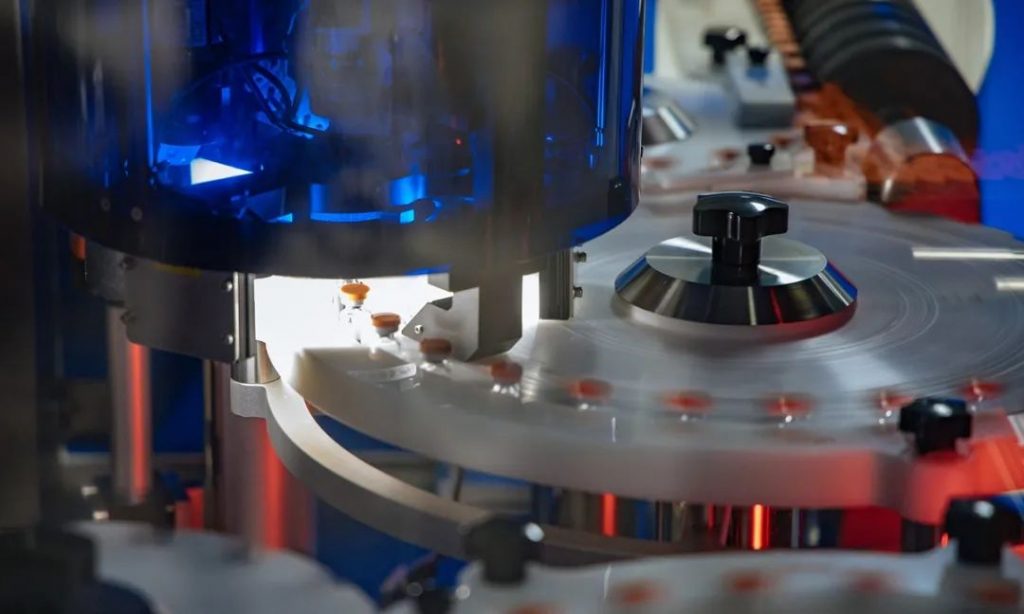
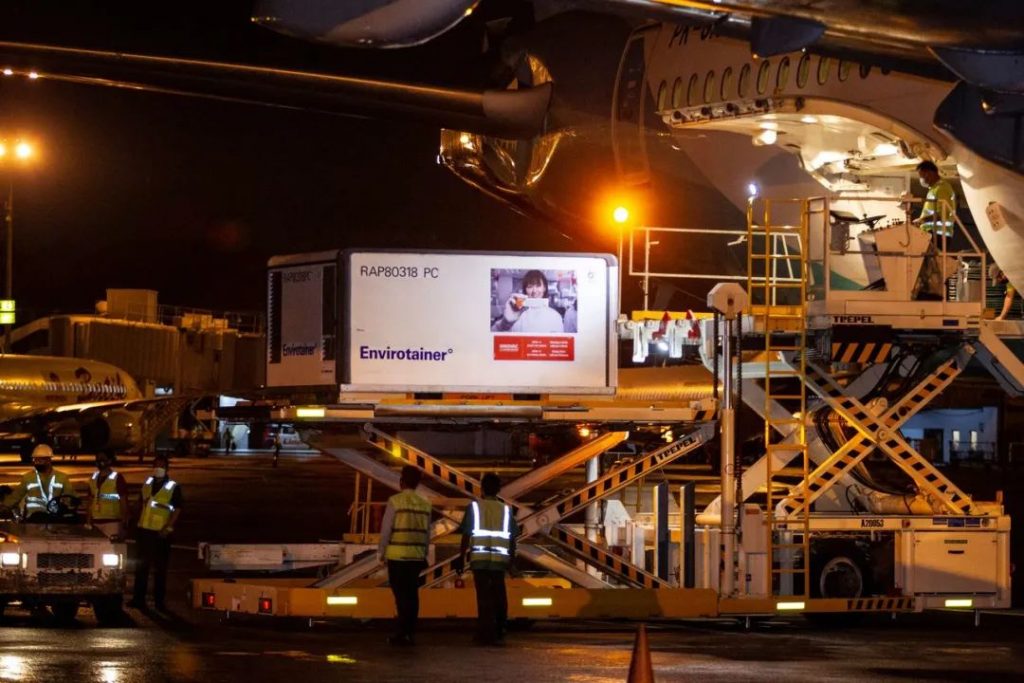
Brazil Phase III Trial Data Monitoring Committee, There are neither Chinese nor Brazilians
Since there is basically no epidemic situation in China, and as a phase 3 clinical trial, the main purpose is to test the protection efficiency of the vaccine, so it can only be carried out in countries with severe epidemics. SINOVACchose a country with a more serious epidemic and a larger population, but without its own vaccine research and development capabilities.
Therefore, SINOVAC has successively started clinical trials in Brazil, Indonesia, and Turkey. At the “First China Health Technology Innovation and Development Conference” held on November 28, SINOVACCEO Yin Weidong stated that in order to ensure the fairness of clinical trial data, there are no Chinese in the five-member “data monitoring committee” for clinical trials in Brazil. , And no Brazilians.
Such a design is to be able to monitor the results of clinical trials more fairly. Brazil should also have confidence in the results of this clinical trial, so it broke through political interference and placed an order.
Because of the epidemic situation in China, it is a dilemma for SINOVAC, who is making vaccines, so we can only get out of the dilemma and go abroad for phase 3 clinical trials. Obviously, this is a huge challenge!
But this dilemma is not entirely bad for SINOVAC. Precisely because the trials are conducted in foreign countries and strictly follow international standards, clinical data are more objective and transparent.
Looking forward to the specific test data, published in professional journals.
(source:chinanet,China SINOVAC COVID-19 Vaccines: 91.25% effective)
Disclaimer of medicaltrend.org
Important Note: The information provided is for informational purposes only and should not be considered as medical advice.

